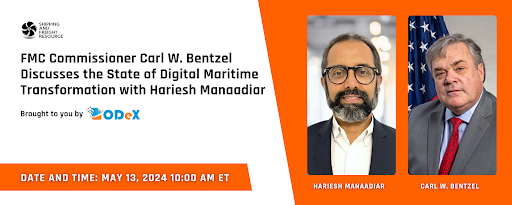MTDI, Data, Technology and barriers to adoption
MTDI, Data, Technology and barriers to adoption
A conversation with Commissioner Carl Bentzel - FMC
The business of sea freight is complex and at times complicated, involving multiple stakeholders such as ship owners, operators, cargo owners, port and custom authorities, and logistics service providers.
The maritime industry has long been a backbone of global trade, facilitating the movement of 80-90% of goods across continents. In recent years, the landscape of maritime logistics has been evolving rapidly due to technological advancements, regulatory changes, and geopolitical developments.
In this context, the Federal Maritime Commission (FMC) and the Maritime Transportation Data Initiative (MTDI) have been pivotal in driving progress and addressing the challenges faced by the industry.
Recently ODeX orchestrated a webinar with Commissioner Carl Bentzel of the FMC to explore the current state of the maritime sector, digitalization practices and usage of digital documentation and payment platforms, its benefits and the mitigation of demurrage and detention for carriers and customers.
In this discussion with Hariesh Manaadiar, Founder of Shipping and Freight Resource, Commissioner Bentzel discussed the updates from FMC, MTDI, its impact on global trade and also discussed barriers to digital adoption and enhancing industry compliance.
The Role of the Federal Maritime Commission
The Federal Maritime Commission (FMC) is a U.S. federal agency responsible for regulating the international ocean transportation system for the benefit of exporters, importers, and the American consumer. The FMC's mandate includes ensuring a competitive and reliable international ocean transportation supply system that supports the U.S. economy and protects the public from unfair and deceptive practices.
Advancements and Challenges
Since 2021, the FMC has been actively working on several initiatives to enhance data transparency and operational efficiency in the maritime sector.
One of the major developments in this area is the Maritime Transportation Data Initiative (MTDI), which aims to provide real-time scheduling information for ocean carriers for all transits into and out of the United States.
This initiative covers containerized shipping services and intermodal contracts under a through bill of lading. The MTDI's recommendations include real-time in-transit visibility requirements, forecasted estimated arrivals at U.S. ports, and standards for various stages of cargo delivery.
The Maritime Transportation Data Initiative (MTDI)
The MTDI represents a significant step towards improving data transparency and operational efficiency in the maritime industry. The initiative seeks to harmonize the practices of handling cargo and marine terminals, establish standards for delivery stages, and enhance the transparency of information about access to and from terminals.
Real-Time Visibility and Scheduling
One of the critical aspects of the MTDI is the requirement for real-time visibility and scheduling information. Historically, the maritime industry has faced challenges in providing accurate and timely information about ship schedules. In the past, scheduling information was often limited and not available in real-time, leading to inefficiencies and delays.
Commissioner Bentzel highlighted that while some progress has been made, the industry has not yet fully adopted the recommended standards. For instance, Hapag-Lloyd has announced the implementation of 100% tracking of all their containers, not just reefer containers. However, there is still a need for government action to mandate the provision of specific information.
Data Integrity and Standardization
The integrity and standardization of data are crucial for the success of the MTDI. As Commissioner Bentzel pointed out, "data is only as good as the data." The MTDI aims to ensure that data provided by shipping lines and terminals is accurate, timely, and standardized.
This includes implementing time and date stamps for cargo laydown and making this information accessible to cargo owners and their agents and standardization of the lexicon used in the industry.
Adoption Barriers and Technological Neutrality
Despite the potential benefits of the MTDI, the adoption of these standards has faced barriers. Commissioner Bentzel noted that the MTDI's recommendations are technology-neutral, aiming to facilitate the continuous use and expansion of technology in the industry.
When queried about barriers to technology such as online payment platforms, its adoption and usage from the FMC, Commissioner Bentzel said “In terms of technology the recommendations for the MTDI are technology neutral. We require better information so that technology can function better, to facilitate the continual use and promulgation and expansion of use opportunity for technology.
So, we're not going to create any barriers to anything unless it could be used adversely with respect to national security interests. We are technology neutral, and we will not try to create any barriers but rather provide better input”
The FMC is working closely with other federal agencies, such as the U.S. Maritime Administration and the U.S. Coast Guard, to develop clear guidelines and standards for the use of technology in the maritime industry. These efforts aim to ensure that technological advancements are harnessed for the benefit of the industry while safeguarding against potential risks.
Addressing Key Issues: Demurrage, Detention, and Overcapacity
The FMC has been actively addressing key issues such as demurrage, detention, and overcapacity, which have long been challenges in the maritime industry.
Demurrage and Detention
Demurrage and detention charges have been a major concern for shippers and logistics providers. The MTDI includes recommendations to improve the transparency and accuracy of demurrage and detention invoicing. This involves time and date stamping of cargo laydown and providing accessible information to cargo owners and their agents.
The FMC has also implemented changes to ensure that charges are properly invoiced and that there is clear information about the status of cargo. However, challenges remain in fully integrating these data elements to prevent violations and ensure fair practices.
Overcapacity and Freight Rates
Overcapacity and high freight rates have been exacerbated by geopolitical issues and disruptions in major shipping routes. The FMC continues to monitor these issues and their impact on the market.
In response to the issues surrounding the high freight rates due to the geopolitical issues, Commissioner Bentzel opined, “We don't regulate rates. We can regulate whether or not services, or actions related to the market are negatively impacting shipping. So, we continue to monitor that. Most of our services are still under agreements that are monitored by the FMC. We continually look at the rates in those markets, the services in those markets, and make determination.”
Conclusion
The maritime industry is undergoing a transformative period marked by significant advancements in data transparency, regulatory changes, and technological integration. The Federal Maritime Commission (FMC) and the Maritime Transportation Data Initiative (MTDI) are at the forefront of these efforts, working to enhance operational efficiency, improve data quality, and address the challenges faced by the industry.
By providing real-time scheduling information, standardizing data practices, and addressing key issues such as demurrage and detention, the MTDI aims to create a more resilient and efficient maritime transportation system.
As the industry continues to navigate geopolitical and environmental challenges, the adoption of these standards will be crucial in ensuring the reliability and competitiveness of global trade.
Through innovation, enhancing collaboration, promoting transparency and the usage of digital documentation and payment platforms the maritime sector can drive significant improvements in the way goods are transported and traded across the world, ultimately benefiting businesses, consumers, and the global economy.
Get exclusive access to the full webinar recording
Fill out this form to get access to the full webinar recording: https://forms.gle/1xjDKSjue6ff17fn6


















